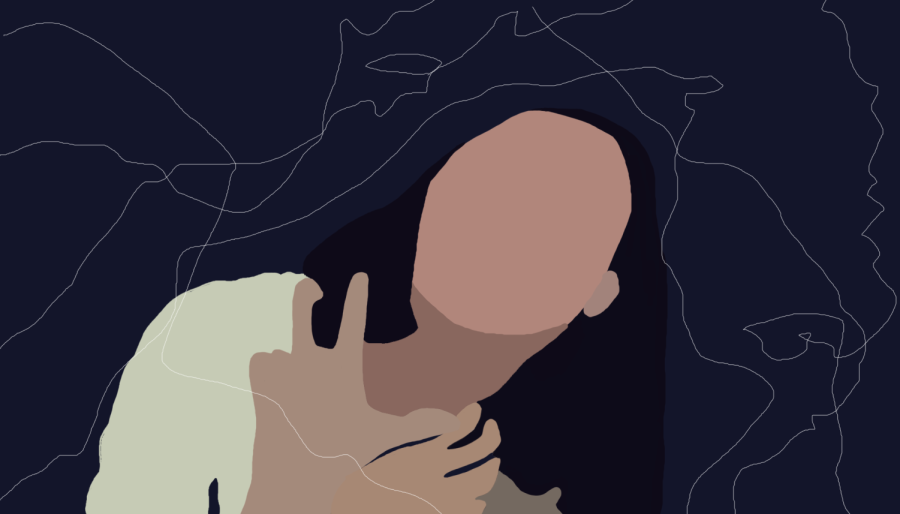Grieving our self-awareness
A review of Mitski’s new album: ‘Laurel Hell’
February 22, 2022
The anguish of self-expectation that mirrors her first album, “Lush,” now having been released 10 years ago, makes itself known in Mitski’s newest work. “Laurel Hell” is reminiscent of an unreleased Hall & Oates LP woven together with Phil Collins’ atmospheric musings so familiarly found on any Genesis album. Mitski holds her own without bending to the whims of the mainstream trends we may see today making the rounds on TikTok. Ephemeral and transcendent of any clear signs of a solid genre label, Mitski embodies the drift in and out of being okay to trust other people. Some tracks incorporate the high-strung bubblegum pop that we remember from the late 80s, but others strive to free us from our natural need for an understandable rhythm.
For the first time in a while, the ‘you’ Mitski serenades is not her long-lost love of a music career, but instead herself. In “Laurel Hell,” she expresses the grief we have over letting go of control. The entire album is seen as a caricature of herself as she looks in from the outside; she is her own obstacle in the way of letting go of control. Some of her fans may balk at her use of the 80s pop formula and bright ostinato and synth, but her lyricism keeps us agonizing over our own self-consuming pain. Mitski refuses to commit to one direction, and while that may deter others from enjoying the album, that symbolism bolsters its underlying meaning: control. Giving it up, keeping it in check, letting it go; this record is all about control. This introspective theme allows Mitski to ruminate about the insecurities of living while an upbeat synth track serves as it’s backing track.
While the majority of the record is an attempt at having a solid framework, some of the tracks retain the early Mitski detachment we all know and love. Dissociative songs like “Valentine, Texas,” “Everyone,” “There’s Nothing Left Here For You” and “I Guess” examine the existential trial of living. We are struggling to be ourselves, to be as authentic as we can, while also struggling to be as vulnerable as necessary to let other people in. “You stay soft, get beaten, [it’s] only natural to harden up.”
There is solid structure in this album, which is strange for Mitski as she’s famously known for the abstractness of her agony, but it doesn’t distract from her overall message: being in control is hard. It’s hell. There’s no wailing or screeching on this record, which to some, may be a disappointment, but her lyrical control over her own misery will forever continue to be a masterpiece in the face of the mainstream music industry.
Why is it lovingly named ‘Laurel Hell?’ In an interview with Pitchfork, Mitski explains that it’s “a folk term for being trapped in thickets of laurel that grow in the southern Appalachian Mountains.” It’s a metaphor for the deadly entrapment of relationships and trust that Mitski has personified into an entity to explain away her selfish need to push others away. .
“And I opened my arms wide to the dark, I said, ‘Take it all, whatever you want,’ I didn’t know that I was young, I didn’t know what it would take.” This record is an open letter about the discipline it takes to maintain healthy control when all you want to do is boil over and fizzle out.
The album pushes the idea to depart from the conventional capitalistic slave-drive. To let go. To embrace the control you fear. “Who will I be tonight, who will I become tonight?” Mitski’s ever-changing persona wards off her own insanity, constantly switching to accommodate her newest muse, herself. This record is very much a love letter to self-awareness, more than anything else. “Laurel Hell” radiates control and muted quietness in the still of the night. It is the thrum of a too-quick heartbeat against the cage of your chest and each track touches the listener differently.
We find catharsis in every bridge and chorus. There are emotive explosions of epiphanies in moments when we realize: no matter how we may struggle within the confines of existing, we all fall into a monotonous routine sooner or later. We are all just trying to be different from everyone else. “Sometimes I think I am free until I find I’m back in line again.” Yeah, I, too, used to think I would tell stories.






